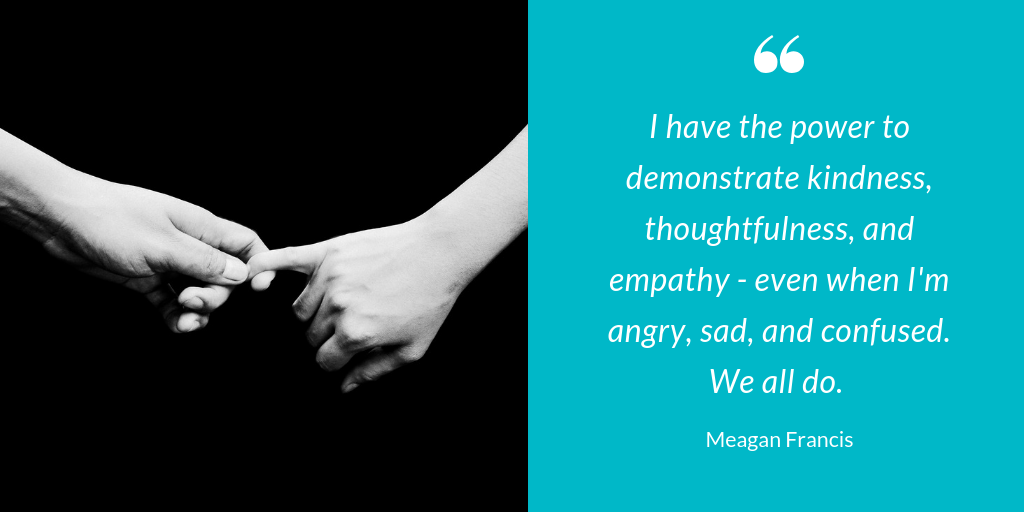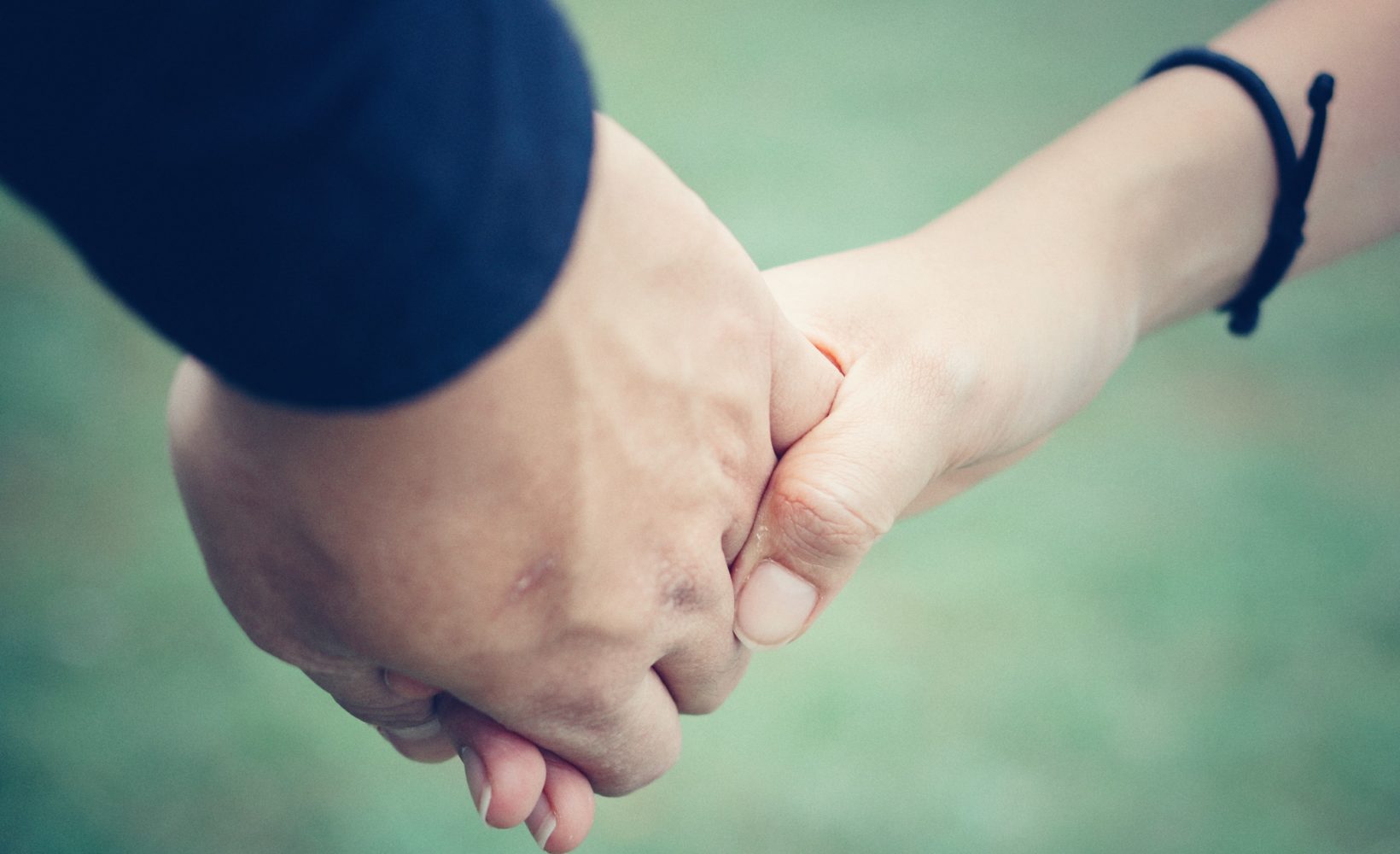Like all of you, we were saddened to hear about the shootings in El Paso, TX, Dayton, OH, and Gilroy, CA this week. We know that it’s likely some of you were directly affected and we are thinking of you. In lieu of our usual monthly essay, Meagan would like to share these thoughts today.
After many years of hiatus, I recently began going to church again.
I hadn’t lost my faith, exactly. In retrospect, I had just gotten tired. Sunday-morning services, once meaningful to me, started feeling like a chore; the messages, often conflicting from church to church, became more confusing than clarifying. I didn’t know what to believe, so it seemed easier to simply believe nothing, or at least, not to think about it very hard. And as often happens when people have a spiritual crisis, I simply drifted away.
But in January I decided one Sunday morning to pop into a church that had been recommended by a few friends, and I’ve been going pretty regularly ever since.
It’s kind of a stretch to call this Sunday morning gathering “church” at all, at least in the traditional sense. There are no obvious hierarchies, no written statement of belief, no objects of sacrament. The congregation doesn’t recite creeds or sing hymns – instead, a (fantastic) band comes out every so often and performs a mix of secular and religious songs, after which we clap – a pretty un-churchy thing to do, but a huge relief for someone like me, who always feels just plain weird not applauding someone’s performance.
The services take place in the high school auditorium, with the house darkened so all eyes gravitate toward the stage. The speaker (I don’t think anyone is referred to as a pastor) delivers a fully-executed presentation that incorporates video and other multi-media elements, punctuated only by well-timed breaks for another song, and always with a conclusion that brings it all home so the message lands every time.
The “congregation” doesn’t have to do anything beyond watch and learn. The whole thing is so non-traditional, that the first few times I went I jokingly referred to it as a “Ted Talk For God”.
But make no mistake, this small organization takes their work seriously, and the way they deliver their message simply works. Without all the interruptions and self-consciousness that can come with the bells and whistles of a traditional religious service – bells and whistles that I’ve historically rather liked, by the way – I’ve found that I relax, recede into my seat, stop looking around at others or thinking about myself, and concentrate on the message at hand.
As a result, I’m completely engaged, and always hear something I really need to. I’ve been brought to tears at nearly every service I’ve attended, and wake up on Sunday mornings looking forward to a message that always seems to be speaking directly to me.
Not this Sunday morning, though. I woke up late, and on the tail-end of Sarah’s and my two-week semi-vacation (we didn’t exactly close our doors, but we both traveled and kept our workloads much lighter than usual) I kinda felt like slacking off. “Maybe I’ll just lie in bed and play around on my phone,” I thought.
Then I pulled up Facebook and saw that news that, within the last 24 hours, at least 29 people had been killed and dozens of others injured in two separate mass shootings – on at a Wal-Mart in El Paso, Texas; the other at a bar in Dayton, Ohio. The El Paso shooting appears to be racially motivated, targeting Hispanic members of the community. Less is known about the Dayton shooter, but reports say he was wearing body armor and carrying an assault weapon; clearly this was not simply a bar brawl that got out of hand. These came on the tails of another shooting earlier this week, at a GARLIC FESTIVAL in northern California, for crying-out-loud. I’m sure some of the victims are children, something I especially hate to think about – but me hating to think about it doesn’t make it any less true.
Not having been online much over the last few days, by the time I learned about all this I was pretty late to the conversation. My Facebook feed was already full of division, lines drawn in the sand, and arguments over politicizing tragedy, gun control, mental health, racism and nationalism – not to mention lots of speculation about the causes of these incidents, and the ones before them, and the next ones to come.
I was immediately overwhelmed by the same emotions I’m sure a lot of you feel when faced with big, tragic, and complicated news: sadness, horror, confusion, and more than a touch of self-righteous anger as I read comments that didn’t line up with mine.
“So, yeah, I need to go to church, then,” I thought.
I was a few minutes late, and when I got there, the programming director was talking about the shootings and about to lead an opening prayer – something unusual at Storyline, in my experience, but definitely warranted. I slid into my seat just in time, grateful for the darkened room that kept eyes off of me.
The prayer was short and to the point. “We don’t know what to do,” he said simply, and asked for divine guidance.
And then, the band performed “You’re So Vain” by Carly Simon.
Never in my life would I have thought that song fit in a church service, but seeing the lyrics up on the screen gave it more meaning than when I’d thought of it as simply a catchy pop tune from my parents’ generation. You’re so vain. You probably think this song (opinion, status, tragedy…) is about you.
Then the speaker, Jill, got up to deliver her message. She was subbing for the usual speaker, Mike, and for a moment I groaned inwardly because I really like Mike’s talks and who cares if he needs a vacation, or if this woman might have something valuable to say, because isn’t church all about me and what I need? (you probably think this service is about you…)
As it turned out, what I resist is often what I need, and this week’s Ted Talk For God was no different.
The topic was about empathy and its opposites: self-involvement and narcissism. Jill discussed the “selfie machines” we all carry around, our culture’s growing obsession with status, how little time we spend now caring about others or trying to understand them. Instead, we live in self-created bubbles, demonizing or simply avoiding people who think differently from us while trying to promote our own self-interests.
What if, she asked, we allowed our “hearts to be broken” for someone besides ourselves?
Jill’s presentation obviously took her significant time to put together, and it wasn’t created as a response to these recent shootings. But as she talked, all I could see were connections.
When bad or confusing things happen, we retreat to our corners and dig in on our positions, whether they’re on gun control or security or mental health or whether leaders are giving the appropriate responses. Those are important conversations, and they absolutely need to happen. More than that, they need to lead to action.
But in fixating on the details, I think we often miss something even more essential. A culture of sarcasm, and meanness, and self-absorption – a culture, let me be clear, that is often actively encouraged by our leaders and powerful voices in the media, and to which we all contribute in a variety of ways – can’t help but lead to division and desensitization.
And while I can’t prove that division and desensitization directly causes violent acts like these – though it seems likely that they do – that cultural trend certainly doesn’t help in the aftermath.
Human beings need connection. We need to find meaning in what happens around us, which typically requires us to focus on something besides ourselves. Division and desensitization work against our strengths as humans while exploiting our weaknesses. It’s a recipe for disaster, not to mention debates that go nowhere.
So, then, how do we create a culture that encourages empathy? That encourages us to unite, rather than divide?

I like to believe we’re doing it here. By creating a community of compassionate mothers who have empathy for ourselves, for one another and for our children, we’re able to think outside our own small experiences and see motherhood, family life and childhood through a wider lens.
But can we work harder to bring that attitude into other parts of our lives?
I know I often could. When faced with difficult topics, I tend to avoid conflict until, say, I snap and engage in an ill-informed “debate” with some random guy from high school who shows up in my Facebook feed. Rarely does my self-satisfaction in whatever verbal smackdown I might dish out last very long. And almost always, there is another way I could have approached the conversation, a way that might have required humility and self-control, including not engaging at all.
I’m hardly alone. We all have many, many choices to make each day about the way we interact with our social networks, and as imperfect people, occasionally we’re going to make the lesser choice. At a time like this, though, we have even more chances than usual – and even more reason than usual – to make our voices heard.
What if we did it in a way that creates connections rather than divisions, that leads to more understanding and empathy and less “other-ing”?
Like many of you, I don’t really know what to do about this most recent spate of violence and tragedy. I know I can write my elected officials, I know I can continue to educate myself as best I can on the issues so I can be a more informed voter. Those are important things, but in the face of something so big, they can feel like so little.
One thing I know for sure – when we don’t know what to do, often our first response is to avoid or lash out. But they’re both ultimately self-serving approaches, right? Avoiding keeps us safe from conflict. Lashing out allows us to feel smarter or better than others, to protect ourselves by drawing lines.
But maybe it’s even more audacious – and effective? – to set aside our self-interested desires to either avoid or strike, and take another approach entirely.
I may not be as knowledgeable about policy as I’d like to be, or as able to speak as clearly as I’d like to about the Big Issues at hand. But I have the power to connect rather than divide. I have the power to demonstrate kindness, thoughtfulness, and empathy – even when I’m angry, sad, and confused. We all do.
Today I’m trying to remember that I can choose a path that doesn’t either desensitize or disconnect me – that in fact, isn’t about me at all.
Empathy and connection is often the harder path to navigate, no doubt. It’s more uncomfortable. And riskier. And simply requires more of us than passive, drive-by activism or soapboxing.
It also happens to be the thing that makes being human worthwhile, that helps us expand into openness rather than contract into smallness.
It’s actually, I believe, why we’re here. So let’s all roll up our sleeves and dig in together.



Leave a Reply